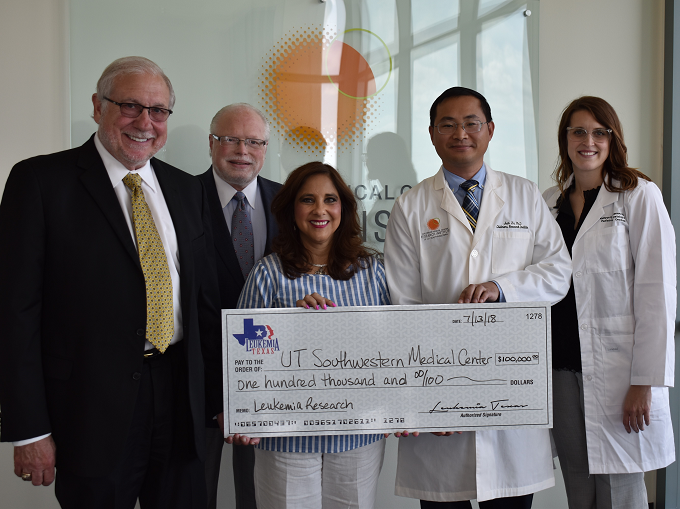Leukemia Texas awards $100,000 for AML cancer research
By Sharon Reynolds

Leukemia Texas partners (from left) James M. Stanley and Kent McAfee, Irma McAfee,
and Drs. Jian Xu and Kathryn Dickerson
UT Southwestern has received $100,000 from Leukemia Texas to support the research efforts of Dr. Jian Xu and Dr. Kathryn Dickerson in acute myeloid leukemia (AML), the most lethal form of blood cancer. Their joint research brings promise of new insights into how genetics plays a role in AML.
Founded in 1970, Leukemia Texas is dedicated to fighting leukemia by funding research and patient aid in Texas. To date, the organization has awarded almost $1.5 million to UT Southwestern researchers. Mandy O’Neill, Chief Executive Officer, said major advances have been made in leukemia treatment over the years – but much work remains to be done.
“The scientific advisory board of Leukemia Texas has put its trust in UT Southwestern researchers for so many years,” Ms. O’Neill said. “Finding a cure for leukemia is a team effort, and we appreciate the opportunity to share this gift. We know we’re moving the needle forward to advance science by funding their amazing work.”
“Leukemia Texas continues to accelerate progress toward better treatment options and outcomes for Texans who are struggling with a leukemia diagnosis,” said Dr. Daniel K. Podolsky, President of UT Southwestern. “We are grateful for this gift and the promise it represents.”
AML is a complex condition in which a one-size-fits-all treatment approach does not work. Drs. Xu and Dickerson are working on a viable high-risk project to develop new methods to identify AML-causing alterations in genes that may serve as successful targets for diagnosis and treatment. This research has the potential to significantly advance the understanding of AML and to lead to personalized treatments with better patient outcomes.
“This project represents research considered high-risk due to lack of existing methods or knowledge,” said Dr. Xu, Assistant Professor, Children’s Medical Center Research Institute at UT Southwestern. “If successful, this research may lead to highly impactful findings that facilitate the development of curative treatments for leukemia. The high-risk/high-impact nature of this research makes it difficult to secure sustainable support from national funders. Thus, the gift from Leukemia Texas is crucial in furthering this work.”
Those diagnosed with AML face a poor prognosis. According to the National Cancer Institute, each year the disease strikes almost 20,000 Americans of all ages and races, and more than 10,000 people will die of the disease. Despite advances in treating other blood cancers, the standard of treatment for AML – a combination of toxic chemotherapies – has remained the same for more than 40 years. AML, one of the most costly cancers, can devastate families at all income levels.
“We hope our study will lead to improved treatment plans for patients with AML to not only increase cure rates, but also to decrease the suffering and loss from the grueling treatments currently used in practice,” said Dr. Dickerson, Assistant Instructor of Pediatrics in the Division of Hematology and Oncology.
Dr. Podolsky holds the Philip O’Bryan Montgomery, Jr., M.D. Distinguished Presidential Chair in Academic Administration, and the Doris and Bryan Wildenthal Distinguished Chair in Medical Science.